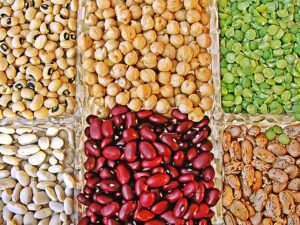 There are so many wonderful meals to enjoy that have less or even no meat at all. One way to eat less meat is to switch to a diet based on plant foods. Plant-based diets can be full of tasty, colorful variety, and you can still enjoy a delicious, balanced diet.
There are so many wonderful meals to enjoy that have less or even no meat at all. One way to eat less meat is to switch to a diet based on plant foods. Plant-based diets can be full of tasty, colorful variety, and you can still enjoy a delicious, balanced diet.
Benefits of Plant-Based Diets
A plant-based eating pattern can be an exciting opportunity to try new foods and flavors. Also, eating more plant foods and less meat is associated with a myriad of health benefits. Eating a plant-based diet rich in whole, unprocessed foods is linked to reduced risk of chronic diseases such as heart disease, type 2 diabetes, hypertension, and cancer.
Types of Plant-Based Diets
Plant-based diets can be colorful and health-promoting! Enjoy lots of whole grains, fruits and vegetables, and plant-based protein sources, like beans, nuts, seeds, and soy products.
Here are a few eating patterns to consider trying out or adopting long-term:
- Plant-based: Plant-based diets mean eating more plants and less meat. A healthy diet can absolutely include animal protein sources, like eggs, lean meats, and dairy. However, eating these foods in moderation can improve your health and help the environment, too.
- Incorporate plant protein like tofu or tempeh, in place of meat, into vegetable stir-fries for a quick and easy meal. Enjoy over brown rice or quinoa.
- Use meat to enhance the flavor and texture of a dish instead of as a main feature of the meal.
- Replace some of the meat in tacos, spaghetti, chili, or burgers with tofu, beans, or mushrooms.
- Have a pizza night at home with lots of colorful vegetable toppings.
- Vegetarian: There are lots of different types of vegetarian diets, each eliminating certain foods. For example, lacto-vegetarians eat dairy but not eggs, whereas lacto-ovo vegetarians eat both dairy and eggs. The variety of vegetarian diets means you have many options if you are considering vegetarianism.
- Vegan: Vegans do not eat anything that comes from animals, including dairy, eggs, and honey. There is no shortage of delicious vegan meals to enjoy! However, it is important to recognize that some nutrients in plants are either absent or only present in limited amounts, such as vitamin B12, calcium, and iron. Be sure to check with your doctor about if you need to take supplements.
Be Creative with Plant-Based Meals
It is so important to enjoy your food! Have fun with whatever eating pattern you decide to follow, and let the kitchen be a place of exploration and creativity. Here are some tips to get you started or help you continue on your plant-based journey:
- Meatless Monday is a classic, but you can make any meal meatless. Tofu Tuesday or Stir-fry Saturday, anyone?
- Pick up a vegetarian or vegan cookbook.
- Ask friends and family for their favorite plant-based recipes.
- Consider joining a community garden, starting your own home garden, or purchasing a community supported agriculture (CSA) share.
- Make a folder or book of your favorite plant-based recipes and share them with family and friends.
What are some of your favorite plant-based dishes? We would love to hear your ideas in the comments!
 Cheers to your health!
Cheers to your health!

